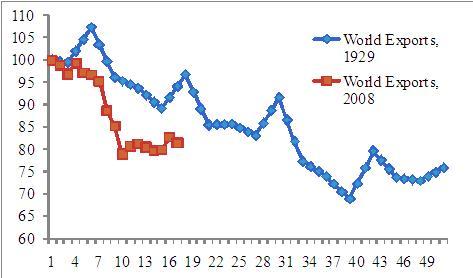The collapse of trade in the immediate aftermath of Lehmann Brothers took the entire world by surprise. It was unprecedented in the sharp rate of decline – even though trade dropped more during the Great Depression (Eichengreen and O’Rourke 2009), it took years to achieve what was done in a few months in 2008!
Figure 1. World exports, 1929 and now (June 1929 =100, April 2008 = 100)
Source: Eichengreen and O’Rourke (2009).
Trade has revived from its low, although growth in trade is not yet by any means robust. And, despite the pledge of the G20 in November 2008 to eschew any protectionist measures for the 12 months, 145 were initiated through September 2009 and some have already been implemented (Evenett 2009).
Looking forward
On the surface, that spells bad news for the global international trading system, and therefore for the growth prospects for the world economy. Robust growth of international trade has been an engine of growth for the world as a whole since the end of the Second World War.
Beneath the surface, there are glimmers of hope. Economies are more closely interconnected than at any time in the past. The supply chains for many goods and services stretch across a number of countries, and the truth of this statement has been vividly demonstrated to politicians and businessmen alike. And, while there have been a large number of protectionist measures, the volume of trade affected has, to date, been much smaller than might have been anticipated given the severity of the downturn. That probably reflects recognition of the extensive benefits of the multilateral trading system.
If one views the glass as half full, the trauma and effects of last year’s abrupt decline in trade reawakened recognition of the importance of trade and could serve as a catalyst to finish the Doha Round of multilateral trade negotiations and to strengthen the multilateral trading system. The huge gains to open multilateral trade became evident to all as the system choked temporarily. Completion of the Doha Round would strengthen the WTO (whose credibility has been damaged by the delays in negotiations), and reinforce the upturn in economic activity, as exporters would no longer hesitate to invest for lack of assured future levels of market access. It would also enable low-income countries to accelerate their growth rates once again, as access to markets is critical for their prospects. No poor country has been successful in accelerating growth without opening its markets and integrating with the world economy. For the still-poor countries, a vibrant open multilateral trading system would offer the best platform for enhancing their growth rates and alleviating poverty.
Rebalancing is necessary
At the same time, it is increasingly recognised that global imbalances, and the low real interest rates that resulted from them, were a major contributory factor to the crisis. While strengthening the open multilateral trading system, it will also be essential to begin “rebalancing” the global economy to prevent the repetition of this past decade. That will mean that successful emerging markets, and other countries with large current account surpluses, must shift gradually toward more reliance on domestic demand and less on export growth as they continue their growth.
It is to be hoped that the G20’s proposed “peer review” process, overseen by the IMF, will enable the necessary changes. Increases in domestic demand in the countries that were earlier incurring large current account surpluses, while simultaneously enabling the deficit countries to reduce their current account deficits through enhanced exports, will be central to this effort.
If the open multilateral trading system is revitalised and the issues associated with global imbalances and the international financial system are addressed, it is reasonable to expect that the international economy can continue the current upturn and accelerate growth.
The protectionist threat is still there
The more pessimistic view might be that the severity of the recession has disillusioned many, and that the future will witness additional protectionist pressure and measures. That this is not likely is largely because all economies have experienced the impact of the downturn, and learned the degree to which they were interdependent and gained from trade.
But, should protection intensify, the consequences over the longer term will be dire:
- Exporters will invest less, and real incomes will grow more slowly.
- The efforts at policy reform in poor countries will be more difficult, and the payoff smaller, than in a more prosperous international economy.
- There would be likely to be resort to increasing regionalism, and preferential trading arrangements, without the necessary strengthening of the open multilateral trading system.
Concerns about the formation of trading blocs, with the associated risks of trade wars, would not be unwarranted. Yet even if it is only trading blocs with no increase in tit-for-tat trade measures, concerns are very real. Without the rules-oriented basis for the international trading system, it is hard to imagine healthy growth of the international economy.
Trade revival: One economic stimulus without fiscal cost
Many of the measures that governments would like to undertake to strengthen the upturn would be costly, and awareness of fiscal challenges is growing. Reviving the Doha Round and strengthening the open multilateral system can be achieved with little, if any, fiscal cost. So, while the trade collapse was one of the most dramatic and costly features of the global recession, trade revival could also do much to shore up prospects for a sustained upturn, and at virtually zero fiscal cost.
The GATT and then the WTO have underpinned the international trading system for sixty years, but they were each in turn largely invisible to ordinary businessmen. One lesson coming out of the crisis, visible to all, has been their importance. It is to be hoped that that lesson spurs the rapid completion of the Doha Round and strengthens the international economic system.
References
Evenett, Simon (2009). “The G20's assault on world trade”, VoxEU.org, 22 September.
Eichengreen, Barry and Kevin O'Rourke (2009), “A Tale of Two Depressions,” VoxEU.org, 6 April.



